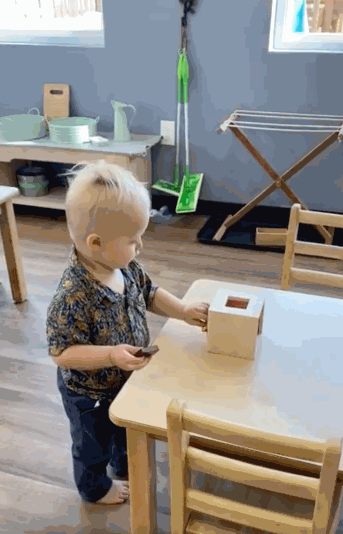Never interrupt your child when they're focusing
With more distractions than ever, here's how to build concentration early
Many people think it’s unreasonable to expect a toddler to have an attention span or to be capable of developing one.
It’s common to hear that kids are naturally unfocused and messy, their rampant energy leading them to bounce off the walls — and that there’s really nothing we can do about it.
The same was true in Montessori’s time; children were considered loud and unruly, constantly flitting from activity to activity.
But Montessori believed that children are capable of deep focus and concentration. She observed that there was no innate childhood trait that causes a destructive lack of attention in kids.
On the contrary, she discovered that a child’s environment can make concentrating difficult.
This means that in the right environment, even young children are capable of deep focus:
What focus looks like in young children
It can be hard for the untrained eye to see what it looks like when a child is focused. They won’t be sitting quietly with their heads down, working on something for three hours straight.
Rather, focused children don’t need an adult to tell them what to do next. Their ventures are purposeful, not impulsive or destructive.
In a typical Montessori Children’s House, designed for ages 2.5 to 6, a focused child might:
Explore the carefully curated materials on the classroom shelves
Prepare snacks and clean up after themselves
Quietly contemplate their completed work
Witness other children’s lessons
While some of these activities might not look like “focus” in the traditional sense, they all fall under the umbrella of concentrated, purposeful behavior.
This is what we mean when we say that a five-year-old student can focus for three hours at a time.
Now, is this something they can achieve on day one? Absolutely not! The ability to concentrate is something that a child builds over time.
The environment is one half of the equation — but our intervention (or lack thereof) is the other half:
Never interrupt a focused child
Unfortunately, if our children aren’t doing something that we immediately interpret as being purposeful, we tend to intervene.
We might start asking them questions or encouraging them to move on to another activity, oblivious to the fact that they’re already hard at work. Questions like, “What are you doing?” and “Why don’t you do XYZ instead?” inform kids that their efforts aren’t important.
Even interrupting a child to offer praise or to provide help with something they’re stuck on can disrupt focus.

We’d feel the same way. Imagine writing out an important email to your boss while your partner watches over your shoulder, commenting on each sentence you write, offering input, or complimenting you on your good spelling. It’d become very difficult to work — and probably a little frustrating, too!
If a child is faced with persistent distractions, they will have more trouble focusing not just in the moment, but also later on, as they won’t be able to trust that they can fully dive into something, knowing they won’t be interrupted.
So, what’s the alternative?
Don’t interrupt!
Even our one-year-olds can focus for extended periods. We just have to train ourselves to notice what it looks like. And once we do, it’s incredible to witness how they explore and interact with the world (without constant input from us).
How to grow focus at home
As a parent, the best thing you can do for your child’s concentration is curate an environment that facilitates deep focus.
This should be a quiet, safe space where age-appropriate materials and toys are displayed neatly and simply. Make sure they can access materials without needing your help to do so, and keep the choices minimal, so they’re encouraged to go deep on a few activities (rather than flitting from one to another).

In a properly prepared environment like this, concentration naturally builds over time. Montessori observed patterns in this and created charts to illustrate her findings.
Above the dotted line, a child is engaging in purposeful activity, and beneath the dotted line, they’re unfocused and potentially disruptive:
In Montessori’s own words:
“Praise, help, or even a look, may be enough to interrupt him, or destroy the activity... After all, we too sometimes feel unable to go on working if someone comes to see what we are doing... as soon as concentration has begun, act as if the child does not exist. Naturally, one can see what he is doing with a quick glance, but without his being aware of it.”
In short: honor your child’s focus — and it will grow.
☀️ This week’s bright spots:
If you have one minute… Watch this video on Montessori’s hack for helping kids build focus.
If you have five minutes… Read this blog on 6 ways to build your toddler’s attention span.
If you have ten minutes… Read Matt’s blog on how his newborn baby learned to focus (and move, see, and eat!) in the first three months of life.











Children of today are missing so much.
https://open.substack.com/pub/abforbes/p/my-incredible-childhood?r=yn8c0&utm_medium=ios